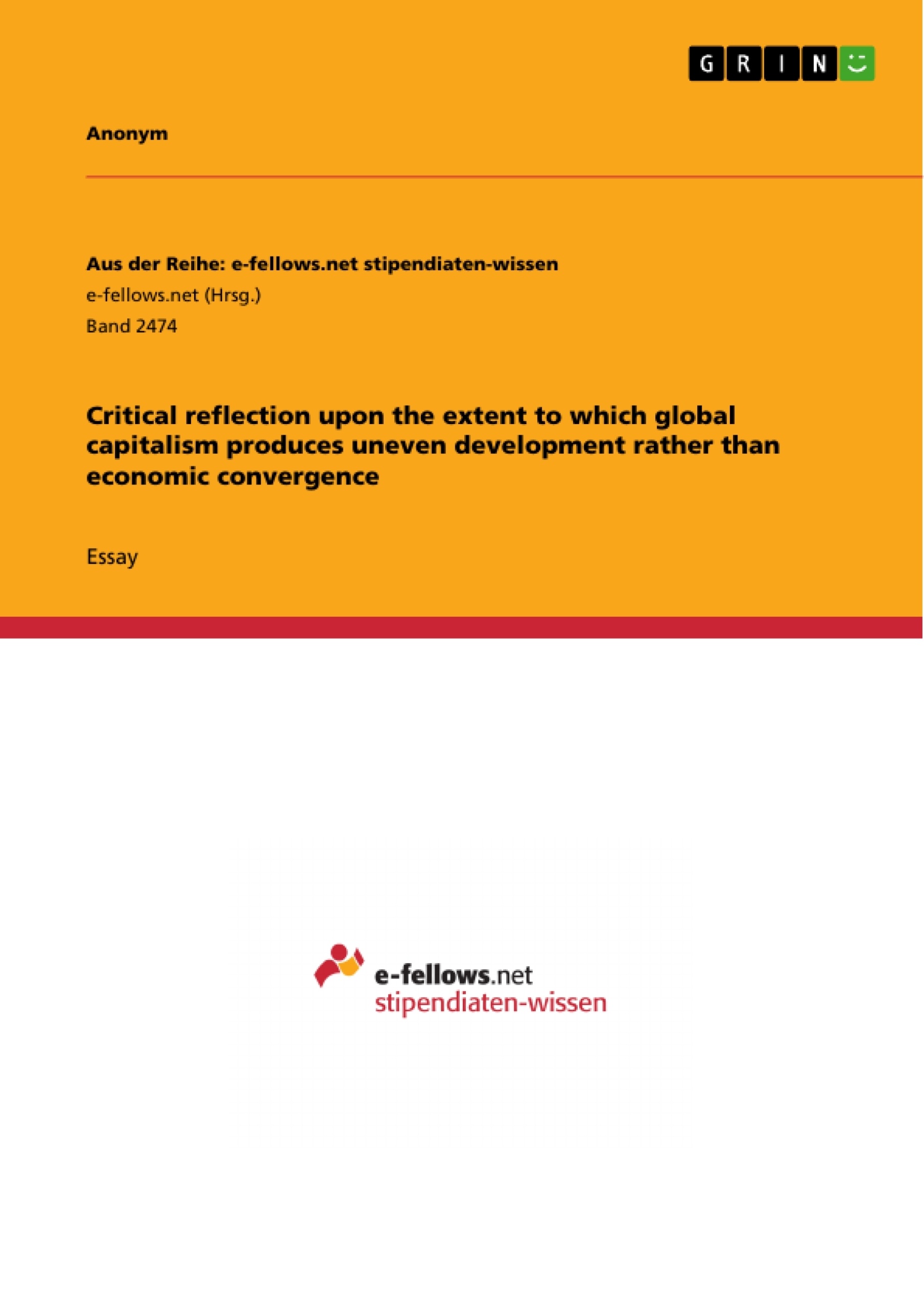"Just 8 men own same wealth as half the world" - With this title Oxfam published its annual study on global inequality in January this year. Even if the exact calculation of their numbers is controversial, the report itself is shocking.
In answer to this news the scientific debate about global inequalities as well as economic convergences, which emerge within the structures and processes of our global capitalism, break out again. The Nobel laureate Joseph Stiglitz, for example, blames
global capitalism for this development and sends an appeal for strengthened corporate social responsibility.
In this essay I therefore want to examine to which extent global capitalism can be seen as the producer of uneven development rather than of economic convergence.
Since the early 1980s the winds of global capitalism became stronger. It was a period where developing countries with their mostly inward-looking and nationalistic policies suffered deep crisis like the Latin American depth crisis as of the early 1980s or the collapse of the Soviet Bloc in 1991. During this era neoliberal economies of the more developed world built the hegemonic power [...]
Inhaltsverzeichnis (Table of Contents)
- INTRODUCTION
- HISTORY OF GLOBAL ECONOMIC POLICIES SINCE THE EARLY 1980s
- THE IDEA OF CAPITALISM AND ITS THEORETICAL CONTRIBUTION TO OVERCOME GLOBAL INEQUALITY
- The Kuznets Curve on Inequality (1955)
- Neoliberal Instruments and Convergence Between Societies
- EMPIRICAL ANALYSIS: HOW DID ECONOMIES REACT TO THESE POLICY CHANGES IN TERMS OF INEQUALITY?
- Convergence in Industrialisation vs. Global Inequality
- Income-inequality Between Countries
Zielsetzung und Themenschwerpunkte (Objectives and Key Themes)
This essay critically examines the extent to which global capitalism generates uneven development rather than economic convergence. It explores the impact of neoliberal economic policies, particularly the Washington Consensus, on both developing and developed countries.
- The role of global capitalism in shaping economic development.
- The impact of the Washington Consensus on developing and developed countries.
- The relationship between industrialisation and inequality.
- The theoretical and empirical evidence regarding economic convergence and divergence.
- The role of factors such as China’s economic growth in influencing global inequality.
Zusammenfassung der Kapitel (Chapter Summaries)
The essay begins by introducing the current state of global inequality and the debate surrounding it. It then delves into the history of global economic policies since the early 1980s, focusing on the emergence of the Washington Consensus and its impact on developing countries.
The essay then explores the theoretical foundations of global capitalism and its potential to overcome inequality. It examines the Kuznets curve on inequality and the theory that neoliberal policies, through industrialisation, would lead to convergence between societies.
Finally, the essay provides an empirical analysis of how economies have reacted to the Washington Consensus in terms of inequality. It examines the convergence in industrialisation and the divergence in global inequality, particularly focusing on income inequality between countries.
Schlüsselwörter (Keywords)
The essay focuses on key terms and concepts such as global capitalism, uneven development, economic convergence, Washington Consensus, neoliberal policies, industrialisation, inequality, Kuznets curve, and global income inequality.
Frequently Asked Questions
Does global capitalism lead to economic convergence?
While neoliberal theory suggests convergence, empirical evidence often shows uneven development and widening income inequality between countries.
What is the Washington Consensus?
The Washington Consensus refers to a set of neoliberal economic policy recommendations for developing countries, emphasizing free markets, privatization, and deregulation.
What does the Kuznets Curve suggest about inequality?
The Kuznets Curve hypothesizes that as an economy develops, market forces first increase and then decrease economic inequality.
How has China's growth affected global inequality?
China's rapid industrialization has significantly contributed to global economic shifts, though it also highlights the complex nature of convergence in the industrial sector versus income inequality.
What is Joseph Stiglitz's view on global capitalism?
Nobel laureate Joseph Stiglitz blames global capitalism for increasing inequality and calls for stronger corporate social responsibility and policy reforms.
- Quote paper
- Anonym (Author), 2017, Critical reflection upon the extent to which global capitalism produces uneven development rather than economic convergence, Munich, GRIN Verlag, https://www.grin.com/document/369413



